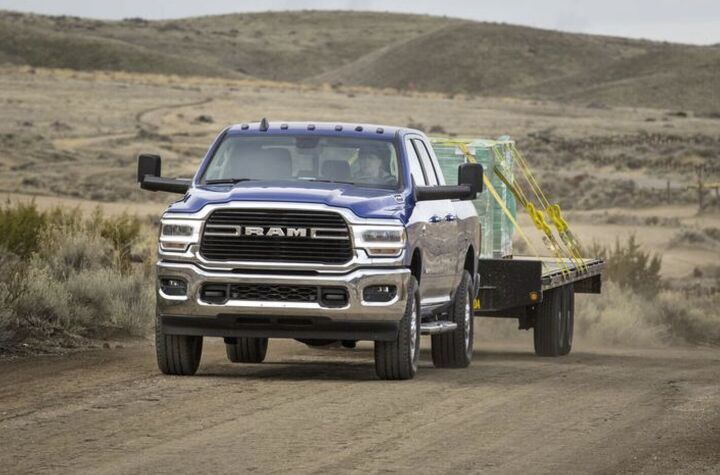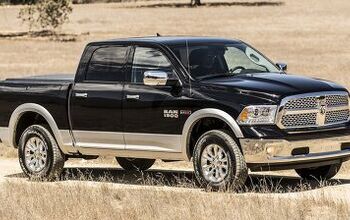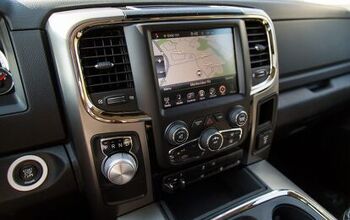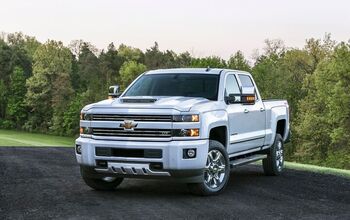NHTSA Investigating Ram's Diesel Pickups

The National Highway Traffic Safety Administration has opened an investigation into nearly 605,000 heavy-duty Ram trucks. A report from the regulator’s Office of Defects Investigation has tabulated 22 complaints from the 2019 and 2020 model years, all of which use 6.7-liter Cummins turbo diesel engines, spurring the NHTSA to launch a formal investigation. Complaints revolve around loss of motive power, with most incidents occurring above 25 mph and resulting in the “permanent disablement of the vehicle.”
While the public was not made aware of the investigation until Monday, the agency launched its probe last Thursday on October 14th. The goal will be to establish how widespread the presumed defect is, what exactly caused it, and any potential safety hazards relating to the issue. Some headway has already been made, however.
Back in 2019, Fiat Chrysler Automobiles (now Stellantis) issued Warranty Bulletin D-19-02 to dealers. The memo requested stores participate in a campaign to “collect, monitor and correct quality issues” on certain MY 2018-2020 Ram trucks equipped with the 6.7-liter Cummins. The NHTSA’s action summary states that this resulted in FCA and an unnamed supplier collecting and inspecting high-pressure fuel pumps.
Vehicles under suspicion include all Ram 2500, 3500, 4500, and 5500 HD pickups from the 2019-2020 MY. The NHTSA plans on looking into the trucks to determine whether or not it needs to press Stellantis to launch a recall. That means asking the manufacturer to give its take on the situation while it compiles warranty claims, injury reports, and whatever FCA previously had on those suspect fuel pumps.
Regulators have been incredibly hard on diesel vehicles ever since Volkswagen’s emissions scandal upended the industry in 2015. While a part of me wants to believe the NHTSA just has it out for Ram’s HD lineup (since a few have asked), it seems far more plausible that this was a standard, shrug-your-shoulders defect. Selective environmental regulations have made diesels cost more as they’ve gradually amassed a bevy of pollutant controlling hardware while also complicating powertrains to a point that has lessened their overall effectiveness. But the impact this has had on their reliability is less obvious and may have nothing to do with a bunch of subpar fuel pumps.
Let’s face it, U.S. regulators haven’t been shy about hitting manufacturers with emissions-focused recalls backed by the Environmental Protection Agency and/or California Air Resources Board in the past. If they wanted to chide Cummins or FCA/Stellantis over pollution, they could have done so overtly.
Stellantis has said it plans on cooperating with the NHTSA fully, launching an investigation of its own for good measure. So we should have some answers soon, including the name of the supplier. In the meantime, you might want to keep a closer eye on how your HD Ram is running if it falls under the purview of the investigation.
[Image: Stellantis]

A staunch consumer advocate tracking industry trends and regulation. Before joining TTAC, Matt spent a decade working for marketing and research firms based in NYC. Clients included several of the world’s largest automakers, global tire brands, and aftermarket part suppliers. Dissatisfied with the corporate world and resentful of having to wear suits everyday, he pivoted to writing about cars. Since then, that man has become an ardent supporter of the right-to-repair movement, been interviewed on the auto industry by national radio broadcasts, driven more rental cars than anyone ever should, participated in amateur rallying events, and received the requisite minimum training as sanctioned by the SCCA. Handy with a wrench, Matt grew up surrounded by Detroit auto workers and managed to get a pizza delivery job before he was legally eligible. He later found himself driving box trucks through Manhattan, guaranteeing future sympathy for actual truckers. He continues to conduct research pertaining to the automotive sector as an independent contractor and has since moved back to his native Michigan, closer to where the cars are born. A contrarian, Matt claims to prefer understeer — stating that front and all-wheel drive vehicles cater best to his driving style.
More by Matt Posky
Latest Car Reviews
Read moreLatest Product Reviews
Read moreRecent Comments
- Lou_BC Well, I'd be impressed if this was in a ZR2. LOL
- Lou_BC This is my shocked face 😲 Hope formatting doesn't fook this up LOL
- Lou_BC Junior? Would that be a Beta Romeo?
- Lou_BC Gotta fix that formatting problem. What a pile of bullsh!t. Are longer posts costing TTAC money? FOOK
- Lou_BC 1.Honda: 6,334,825 vehicles potentially affected2.Ford: 6,152,6143.Kia America: 3,110,4474.Chrysler: 2,732,3985.General Motors: 2,021,0336.Nissan North America: 1,804,4437.Mercedes-Benz USA: 478,1738.Volkswagen Group of America: 453,7639.BMW of North America: 340,24910.Daimler Trucks North America: 261,959


































Comments
Join the conversation
This is how much I know about diesel pickups... -holds forefinger and thumb at 10mm gap-. But I do know that anytime you drive more than 15 miles from home, you should have a can of this in your truck: https://www.amazon.com/CRC-05110-Mass-Sensor-Cleaner/dp/B000J19XSA
Cummins Switched to a CP4 pump which has a high failure rate. Duramax tried this pump and had lots of problems with it.